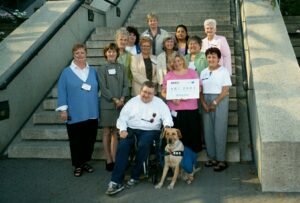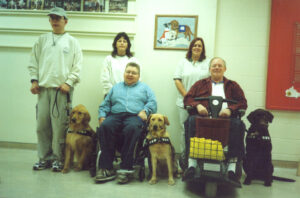Fun Facts
Hometown: Oshawa, Ontario (born in 1961 in Hamilton but moved to Oshawa in 1962). I returned to Hamiilton after graduating from the University of Western Ontario.
Favourite food(s): Italian and Mediterranean. Italian salads. Tapas in Spain, Tabouleh, Hummus, Lamb in the Greece and/or the Levant.
Bucket list item: To travel to London, Paris, Florence, and Istanbul.
Most prized possession: I’m at the stage of my life where I am trying to eliminate many possessions. Packing and moving is an anathema to me – so, for Instance, I have swapped my many books for an Audible account. I do however have a number of items passed down to me by my father.
Favourite organization: The Lions Foundation of Canada Dog Guides. I have had the honour to have had two service dogs: Zadie and Bamboo.


As an older adult, what inspired you to get involved at the Collaborative?
When I was five years old, I contracted Juvenile Rheumatoid Arthritis, however, I was not diagnosed until I was eight years old. My entire life experience has been shaped by this. When I was at university, I was a volunteer patient partner with The Arthritis Society. I also was a subject for medical students to examine and provide diagnoses at University Hospital. Students would cite their diagnosis and observations and the physician would then ask me what they had missed. This, I think, instilled into me the importance of involving diverse patient groups in the development of health policy and research.
When I learned about McMaster’s Collaborative for Health and Aging through the Accessibility Committee for Persons with Disabilities (ACPD) in Hamilton, I thought the time was right to get involved in the role as an older adult. I was approaching the end of my Canada Revenue Agency career and planning to retire soon. I thought, “I’ve done similar work earlier in life, but not nearly as in-depth and focused as at the Collaborative.” And so, between the Collaborative and the ACPD, and a few other organizations, including some fundraising for The Lions Foundation of Canada Dog Guides in the early 2000s, that’s pretty much fulfilled this part of my life.
What does “aging well” mean to you as an older adult? How has this differed as a child and younger adult?

Aging well is heavily reliant on living well as a child and as a younger adult and understanding that preventative care is essential throughout life. As you age, it’s not often recognized that your earlier stages of life are important factors that affect you in your older age, including physical fitness and diet. We haven’t necessarily gotten that education over the years, but I do think it’s improving.
Since using a wheelchair as a mobility device, I have not had a physical exam. Throughout my life, none of my family doctors ever had a bed that would raise and lower so that I could have a physical exam. I believe family doctors should lead in preventative health education. But it can’t only be the responsibility of the doctor. I think there should be much more funding invested in preventative care. Also, throughout life one is competing with very powerful lobbying forces, such as food, chemical, and pharmaceutical groups, that I believe can counter best behaviour. And then, of course, that segues into the pharmaceutical industry that hopes to treat the damage caused earlier in life.
Having a physical disability from early age has made this balance very challenging for me throughout my life, particularly after I had the amputation of my leg. Essentially, I became permanent in a wheelchair when I was unable to obtain an artificial limb. My thoughts were that because, even if I don’t need it for ambulation, I was able to do “standing tolerance” in rehabilitation, which puts compression through your spine, joints and hips to maintain bone density. While I find it challenging to get some level of cardio, I remain committed to maintaining my health to stay in my home.
If you could change one thing about the services and supports in healthcare that are available to older adults, what would it be?
Older adults should have the services and supports that enable them to continue living in their homes. I mean this in the most expansive way – including, where possible and safely, older adults with early onset dementia. An older adult living in one’s home is cheaper than residing in a nursing home. And certainly, cheaper than living in a residential retirement community.

What does meaningfully engaging older adults in research mean to you?
There is no more apt phrase than, “Nothing about us, without us”. It’s a phrase that I researched during the Pandemic. It came out of Europe ages ago and has a long history that has taken a lot of hold and more recently was commonly active with the National Institute of Health (US), and AIDS Research. It is not just a phrase, but a philosophy that makes sense, even when expanding its meaning to include the diversity of the entire population.
Anyone affected by research should be included in the study to achieve better outcomes. Meaningfully engaging older adults in research ensures their experiences and needs are considered, leading to more effective and inclusive results.
What three words would you use to describe your experience within the Collaborative?
Interesting. Challenging. Rewarding.

 Mark McNeil has dealt firsthand with juvenile rheumatoid arthritis for 55 of his 60+ years, and currently still lives in his own home. He graduated from the University of Western Ontario and has worked in the federal government public service sector for over 30 years. Mark has served on the Advisory Committee for Persons with Disabilities at Hamilton City Hall. He eagerly joined the Collaborative which has provided him with the opportunity to add another voice in promoting research and public policy that reflects input from many and contributes to healthy aging in an increasingly older population.
Mark McNeil has dealt firsthand with juvenile rheumatoid arthritis for 55 of his 60+ years, and currently still lives in his own home. He graduated from the University of Western Ontario and has worked in the federal government public service sector for over 30 years. Mark has served on the Advisory Committee for Persons with Disabilities at Hamilton City Hall. He eagerly joined the Collaborative which has provided him with the opportunity to add another voice in promoting research and public policy that reflects input from many and contributes to healthy aging in an increasingly older population.